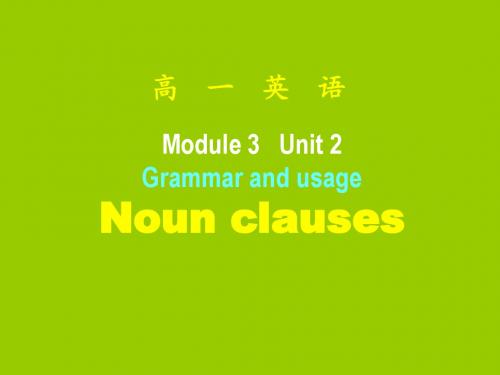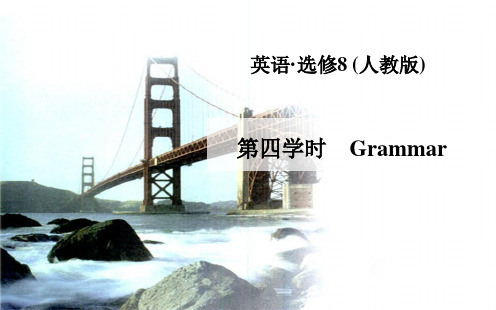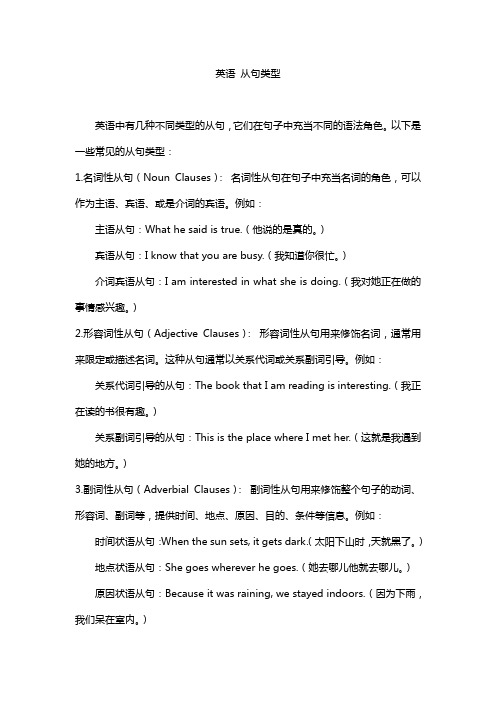Noun Clauses
名词性从句全归纳

C. what
days. A. which C. that A. thought that C. is thought that
D. how
2.It is good news ______ they will arrive in a few B. what D. how B. thinks that D. is thought that
3.It ______ Joe drives badly.
4.It ______ he is late for class. A. may that B. might that C. may be that D. might be what
5.This is ______ she was born. A. where B. which C. that D. what 6.The question is ______ we can’t go there today. A. that B. what C. which D. when
• 4. whether可以直接跟动词不定式连用,而if 则 不能,如: • I didn’t know whether to laugh or to cry. • She hasn’t decided whether to go or not. • 5.引导同位语从句用whether,不用if,如: • The question whether he’ll attend the meeting is essential.
• 同位语从句的连词一般有that和whether.在 某些连词后面有时亦可用连接副词 how,when,where,why等.
同位语和定语从句定语从句的区别
名词性从句总结

名词性从句在句子中起名词作用的句子叫名词从句(Noun Clauses).名词性从句的功能相当于名词词组, 它在复合句中能担任主语、宾语、表语、同位语、介词宾语,形容词宾语等。
因此按照它在句中不同的语法功能,名词性从句又可别离称为主语从句、宾语从句、表语从句和同位语从句。
主要考查语序问题,连接词的选用,时态呼应等。
◆名词性从句的一路点:1)主句和从句之间不能用逗号隔开2)从句部份用陈述句语序◆引导名词性从句的连接词可分为三类:连接词:that, whether ,if 不充当从句的任何成份连接代词:what, whatever( anything that), who, whom,whoever (anyone who), whose, which,whichever连接副词:when, where, how, why一 . 主语从句作句子主语的从句叫主语从句。
主语从句通常由从属连词that,whether,连接代词what,who,which,whatever,whoever和连接副词how,when,where,why等词引导。
that在句中无词义,只起连接作用;连接代词和连接副词在句中既保留自己的疑问含义、又起连接作用,在从句中充当从句的成份。
That she is still alive is a miracle.It doesn’t matter whether they will come or not.It occurred to him that he failed in the examination.What he wants to tell us is not clear.Who will win the match is still unknown.Whichever book you like would be bought for you as a present.Whatever I do is for the good of you.Whoever leaves the room last ought toturn off the lights.When we should close the shop on the holiday has not been decided.Where the meeting will be held has not yet been announced.It is known to us how he became a writer.Why he did so has not been clear.★有时为避免句子头重脚轻,常常利用形式主语it代替主语从句作形式主语,而把主语从句置于句末。
英语:Unit2《Language》Noun clauses课件(1)(译林牛津版必修3)

Fill in the blanks on P29B.
1. why 2. what 3. which 4. how / why 5. how 6. who 7. how 8. which
Practice: 1. _____ the baby could speak A made his parents 主语从句 very happy. A. That If B. What C. Why D.
3. This is C _____ he was often late for school. A. what B. that C. why D. whether
表语从句
4. We all know the truth ____ B the earth ____ around the sun. A. if; moved 同位语从句 B. that; moves C. why; move D. whether; move
I don’t doubt _____ he will be tha admitted to t this university. (whether / that) A I am not certain ____ will win the champions A. who B. that C. which D. what
11. The question is ______ it is worth doing. A. if B. whether C. which D. what 12. The reason he has made such great progress is _______ he has never wasted his time. A. because B. why
M8-U1-名词性从句-主+表+宾-ZY-Ss

1. He asked __ for a violin. (MET1992) A. did I pay how much B. I paid how much C. how much did I pay D. how much I paid 2. It is generally considered unwise to give a child __ he or she wants. (NMET1997) A. however B. whatever C. whichever D. whenever
(3) It is + 不及物动词+从句 不及物动词+ It seems that… 似乎…… 似乎 It happened that… 碰巧 碰巧…… It appears that… 似乎 似乎…… (4) It is + 过去分词+从句 过去分词+ It is reported that… 据报道 据报道…… It has been proved that… 已证实 已证实… It is said that… 据说 据说……
it 作形式主语和 引导强调句的比较 作形式主语和it引导强调句的比较 It is a pity that you didn’t go to see the film. It doesn’t interest me whether you succeed or not. It is in the morning that the murder took place. It is John that broke the window. 被强调部分指人是也可用who/whom。 。 被强调部分指人是也可用
在think, believe, suppose, expect 等动 词之后, 词之后 宾语从句中谓语的否定常 转移到主句的谓语上。 转移到主句的谓语上。 I don’t think he will see you. I don’t believe he will go. We don’t expect he is coming. I don’t think he can do it, can he?
高中英语语法——名词性从句_2

表语 同位语
名词性从句的定义及种类 1. 定义: 在句子中起名词作用的各种从句,统称为名词性从句。 2. 种类: 根据它们在句中所充当的句子成分,可以分为主语从 句、宾语从句、表语从句和同位语从句。
请判断以下哪几句为名词性从句
1.Whether we will go for an outing tomorrow remains unknown. 主语从句 2.The question is when he can arrive at the hotel. 表语从句 3.It was Mary that helped me solve the problem. 强调句 4.Whoever breaks the law will be punished. 主语从句
1. 从属连词: that, if, whether
that: 无词义、不充当从句中的成分,引导第一个宾语从句可省略。 if: 表是否,不充当从句中的成分,引导宾语从句,不可省略。 whether: 表是否,不充当从句中的成分,引导名词性从句,不可省略。
1.__T_h__a_t __we will realize our dreams in the future is certain. 2.The fact is __t_h_a_t_ the Earth goes around the Sun. 3.__W__h_e_t_h_e_rshe will come back on time depends on weather. 4.I asked him __i_f/__w_h_e_t_h_e_r he could do me a favor. 5.Could you tell me the question _w__h_e_t_h_e_r English is useful for us now? 6.Word came ___t_h_a_t_ his son was admitted to Beijing University. 7.The christian Church rejected his theory, saying ___(_th_a_t_)__ it was against God's idea and ___t_h_a_t_ people who supported it would be attacked.
宾语从句,表语从句

2.如果主句是过去的时态(一般过去时,过去进行时), 如果主句是过去的时态(一般过去时,过去进行时) 从句的时态一定要用相对应的过去的某种时态 (一般过去时,过去进行时,过去将来时,过去完成时) 一般过去时,过去进行时,过去将来时,过去完成时) I knew who lived here. I saw she was talking with her mother. He asked whether his father would come back tomorrow. He said that he had seen it .
3.当与 not连用,或提出两种选择时: 当与or 连用, 当与 连用 • I don’t know whether he’s free or not. • Mary asked whether I was doing my homework or not. • Tell me whether you’d like to go shopping or tidy the room. 4. 宾语从句提前时: 宾语从句提前时: • Whether this is true or not, I can’t say.
主语从句
subject clause
宾语从句
object clause
名词性从句 noun clause
表语从句
predicative clause
同位语从句
appositive clause
Object Clauses
宾语从句
M3U3 Grammar
1. I
主语
know him .
谓语 宾语
宾语 位于谓语动词或者介词后
一、宾语从句的概念
从句在复合句中作宾语的名词性从句, 从句在复合句中作宾语的名词性从句, 通常放在主句谓语动词(及物动词)或介词之后。 通常放在主句谓语动词(及物动词)或介词之后。
noun clause

语 法 精 讲
(2) if 不能用在句首引导主语从句,这时用 whether; 与or not 搭配表“是否”时,只能 用whether _________。 eg: 他是否离开了还未知。 Whether he left (or not) is unknown. _______________________
It is a pity that ____________________she has made such a mistake. 她犯这样的错误是令人遗憾的事。 It's strange that ___________________he didn't come yesterday. 他昨天没来是很奇怪的。 It is reported that ___________________the number of wild animals in Africa is decreasing. 据报道非洲野生动物的数量正在减少。 It is said that ___________________there was a terrible plane crash this morning. 据说今天早上有一起可怕的飞机坠毁事故。
注 意:
1. 在表语从句中,表“是否” 时,只能用 “whether”不能用“if”。
2. 一般情况下,“that”不能省。
3. It is /was because …. It is /was why…. 3. The reason (why…/for…)is /was that…. 4 The reason is because that …. /why…
英语 从句类型

英语从句类型英语中有几种不同类型的从句,它们在句子中充当不同的语法角色。
以下是一些常见的从句类型:1.名词性从句(Noun Clauses):名词性从句在句子中充当名词的角色,可以作为主语、宾语、或是介词的宾语。
例如:主语从句:What he said is true.(他说的是真的。
)宾语从句:I know that you are busy.(我知道你很忙。
)介词宾语从句:I am interested in what she is doing.(我对她正在做的事情感兴趣。
)2.形容词性从句(Adjective Clauses):形容词性从句用来修饰名词,通常用来限定或描述名词。
这种从句通常以关系代词或关系副词引导。
例如:关系代词引导的从句:The book that I am reading is interesting.(我正在读的书很有趣。
)关系副词引导的从句:This is the place where I met her.(这就是我遇到她的地方。
)3.副词性从句(Adverbial Clauses):副词性从句用来修饰整个句子的动词、形容词、副词等,提供时间、地点、原因、目的、条件等信息。
例如:时间状语从句:When the sun sets, it gets dark.(太阳下山时,天就黑了。
)地点状语从句:She goes wherever he goes.(她去哪儿他就去哪儿。
)原因状语从句:Because it was raining, we stayed indoors.(因为下雨,我们呆在室内。
)4.感叹句型从句(Exclamatory Clauses):这种从句用于表达强烈的感情或感叹。
例如:What a beautiful day it is!(多么美好的一天!)How clever she is!(她真聪明!)这些从句类型在英语中起到了不同的作用,丰富了语法结构,使得表达更为灵活和复杂。
- 1、下载文档前请自行甄别文档内容的完整性,平台不提供额外的编辑、内容补充、找答案等附加服务。
- 2、"仅部分预览"的文档,不可在线预览部分如存在完整性等问题,可反馈申请退款(可完整预览的文档不适用该条件!)。
- 3、如文档侵犯您的权益,请联系客服反馈,我们会尽快为您处理(人工客服工作时间:9:00-18:30)。
GRAMMAR名词性从句定义:名词性从句是由if, whether, that, how和各种疑问词充当连接词所引导的从句,其功能同名词一样。
二、类型:主语从句、表语从句、宾语从句、同位语从句(请说出以下句子中的画线部分在句子中充当的成分)1. When we’ll hold the sports meeting has not been decided yet.2.The fact that Great Britain is made up of three countries is still unknown to many people..3.He wonder if he could use my bike.4. I am thinking about who will be given the job.5. That he has won the first prize is true.6. My parents’ wish is that I can go to a key university.7. They are discussing the problem whether they should ban(禁止) fishing in the lake.8. The problem is how I can get in touch with them.9. It is not clear whether she will attend his wedding.10. I have no idea when he would return.三、用法1、主语从句:在复合句中做主句的主语。
引导词有连词that (that 不可省),whether; 代词有who, what ,which; 副词when ,where, how, why 等。
如:A. That he is a famous singer is known to us. (It is known to us that he is a famous singer.)B. When he will go to America is not yet fixed. (It is not yet fixed when he will go to America.)2.宾语从句:在复合句中做主句的宾语.引导词有连词that (that 常可省略),whether,if; 代词有who, whose, what ,which; 副词when ,where, how, why 等。
如:A. We believe (that) he is honest.B. I told him (that) I would come back soon.C. He said (that) he would go there the next day and that his family wouldn’t go there.3、表语从句:在复合句中做主句的表语.引导词有连词that (that 不可省),whether; 代词有who, what ,which;副词when ,where, how, why 等。
如:A. The problem is that we didn’t get in touch with him.B. This is how Henry solved the problem.C. His suggestion is that we (should) finish the work at once.(如果句子的主语是suggestion, advice, order等名词时,后面引导的表语从句用should+动词原形,should可省略.)4、同位语从句:在句中起同位语的作用.一般放在名词fact , news , idea , promise, thought , suggestion等之后,用以说明或解释前面的名词。
引导词有连that;少数情况下也可用连接副词等。
如:A. The thought that we might succeed excited us.B. The idea that they should try a second time is worth considering.C. The suggestion that the plan (should) be delayed will be discussed tomorrow.(如果名词suggestion,advice.order等词后的同位语从句的谓语动词要用should+动词原形,should可省略.)四、注意1、注意that 的用法(that引导名词性从句时在从句中不做任何成分,也没有具体的意义。
其他连接词在引导从句时都做相应的成分并有具体的意思。
)①主语从句、表语从句、同位语从句中用that但不能省略。
如:A. That they are good at English is known to us all.B. The problem is that we don’t have enough money.C. She expressed the hope that they would come to China one day.②宾语从句中的连接词that有时可省有时又不可省,在以下几种情况中that不能省略:当that从句和主句谓语动词之间有插入词语或者从句主语之间有插入语时,that不可省略;当that 从句与另一名词性从句并列作宾语时,that不能省;当that作介词宾语时,that不可省掉。
如:A. He judged that because he was a child, he did not understand what he had said.B. Everyone knew what happened and that she was worried.C. The reason lies in that she works harder than the others do.③that从句做主语和宾语时,可以用it 来替换成以下几种结构表达。
(A) It is clear/certain/likely/true/surprising that…(B)It is a pity/shame/good idea/no wonder that ...(C)It is said/reported/ believed/known/thought/suggested that …(DIt seems/happens that。
如:It happened that I went out last night.It is said that China will win in the World Cup.2、注意同位语从句和定语从句的区别:A.从句前都有一个名词B.定语从句中关系词代替先行词在从句中做成分;而在同位语从句中连接词不做成分。
C.定语从句是对前面的名词进行修饰,同位语从句是对前面的名词进行解释说明。
The news that our team has won the final match is encouraging.(同位语从句)我们队取得决赛胜利的消息令人鼓舞。
The news that you told us is really encouraging. (定语从句)你告诉我们的消息真的令人鼓舞The suggestion that students should learn something practical is worth considering.The suggestion that is worth considering is that the students should learn something practical.They put forward the question where they could get the money.This is the place where the accident happened.3、whether和if的用法①whether和if在宾语从句中可以互换,但是作介词宾语时连接词一般用whether。
如:It all depends on whether they will come back.②后面直接跟or not 时用whether。
如:I didn’t know whether or not he had arrived in Wuhan..③主语从句,表语从句,同位语从句中只能用whether。
如:Whether the meeting will be put off has not been decided yet.The question is whether they have so much money.We ought to discuss carefully the question whether we can do it or not.④whether常与or连用表示一种选择,if不能这样用;whether也可与动词不定式连用但if不能。
如:The question of whether they are male or female is not important.I have not decided whether to go or not.⑤whether可引导一个让步状语从句表示“不管”、“无论”,而if不能。
If表示“如果”时,不能用whether。
如:Whether he comes or not, we will begin our party on time.If I have enough time, I will play football.4、疑问词 + ever和no matter + 疑问词的区别:①疑问词 + ever可引导名词性从句,在主从句中要充当一定的部分。
如:Whoever breaks the rule must be punished. You can choose whatever you like in the shop.②疑问词 + ever还可引导让步状语从句。
如:Whoever breaks the rule, he must be punished. Whatever you do, you must do it well.③no matter + 疑问词只能引导让步状语从句。
